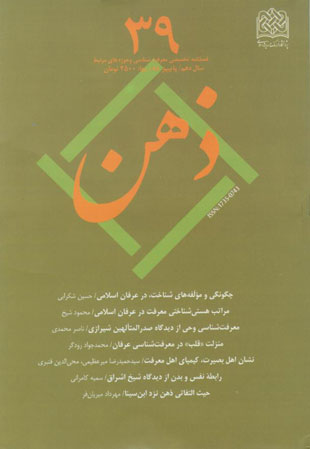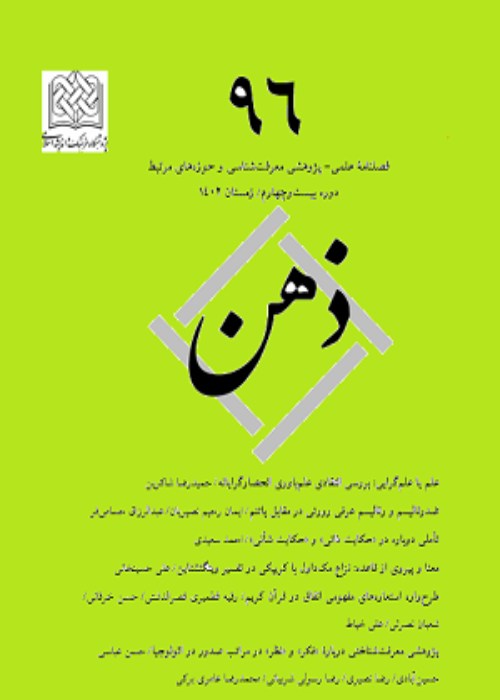فهرست مطالب

فصلنامه ذهن
سال دهم شماره 4 (پیاپی 39، پاییز 1388)
- 182 صفحه، بهای روی جلد: 25,000ريال
- تاریخ انتشار: 1388/08/19
- تعداد عناوین: 7
-
صفحه 71
-
صفحه 93
-
صفحه 117
-
صفحه 147
-
Page 5Like reason and experience, heart intuition is one of the ways to attain knowledge. Having introduced the idea if intuition, mystics say that to understand truths, there is a way beyond reason; and only in this way, unitary identity of being may be known. Report made by the mystic of his own state when he intuits unity appears usually as paradoxical propositions, and un-demonstrability is among points which are discussed in mystical epistemology. Also, esotericism in the sense of belief in a hidden aspect for things and attempts made to understand it as well as reliance on spiritual leaning as one of the main characteristics mystical methodology and on shariah, together with explanation of the path and rules of practical wayfaring may be known among characteristics of Islamic mysticism.Keywords: intuition, unveiling, unity, knowledge, heart, reason
-
Page 27In the present article, ontological levels of knowledge as viewed by Muslim mystics will be described. Like being and man, knowledge has multiple levels, and its levels correspond to levels of existence and man. In the same way that [the world of] being consists of absolutely visible world and absolutely hidden world and the world between the two i.e. doubly hidden world and in the same way that man consists of spirit and body and with the soul and heart in between, knowledge when it belongs to the absolutely hidden world and appears in the spirit and knowledge when it belongs to the absolutely visible world and manifests in body and knowledge when it belongs to the doubly hidden world and appears in the soul and heart is different. In the same way that the doubly hidden world has two faces one of which to the hidden world and the other to the visible world, the middle level of man's being has two layers one of which inclines to body and the other to spirit. The aspect inclining to spirit is called heart and that inclining to body is the soul. Thus, in its middle level, knowledge has two faces as well; one which shows a world inclining to the hidden world and is called the world of Domination and means to know it is formal unveiling; and the other represents a world which inclines to the visible world and that is called the world of Divine power, and means to know it is spiritual unveiling.Keywords: Islamic mysticism, soul, knowledge, intuition, observation, argumentation, study, man, absolutely hidden world, double hidden world, absolutely visible world, certain knowledge, eye of certainty, truth of certainty, heart, spirit
-
Page 53In the present article, at first, we study the nature of revelation in its epistemological aspect. According to Mulla Sadra, the necessary condition for descent of revelation as the best way to acquire knowledge is the prophet's perfection in terns of theoretical faculty. Thus, the necessary condition for one to receive revelation is attainment of acquired intellect and union with the active intellect. In this sense, the prophet is philosopher and sage. In another part of this article, nature of revelation as the loftiest level of intellectual gradation in conjecture, aptitude, sacred faculty, and inspiration is studied. Revelation is higher than conjectural knowledge and even at the highest level of bestowed knowledge, divinely thought, and needless of human master.Keywords: revelation, inspiration, knowledge, conjecture, active intellect, theoretical faculty
-
Page 71The heart is the focus of man's existence and throne of mysticism. Mystically speaking, it is the single source to acquire intuitive and illuminative knowledge; a source which is the locus of mystical experiences and has visible and hidden realms to look at the exterior and interior, earth and heaven; and if it is known and blossoms, and if its dark and light veils are removed, epistemologically it will go across all worlds of beings, and become a chamber to look from which at the Friend, and Throne of the Beloved. The heart receives manifestations of the Essence, Attributes and Acts; and through its dialectical progress it goes from certain knowledge to certain truth to chilliness of certainty to receive Dominical and Divine grace so that divinely inspired knowledge may appear in it. Epistemologically, in mysticism the heart relies on a mechanism according to which by purification of the soul and refinement of the heart one is able to go to journeys through spiritual states and hidden openings. In the present writing, nature and place of the heart in mystical epistemology, factors of and obstacles to existential perfection of the heart, mechanism of mystical knowledge, characteristics and functions of the heart are discussed briefly to provide an introduction to the issue of the heart's achievement and esoteric journey i.e. mystical experiences and intuitions, and weigh them.Keywords: heart, intuitive knowledge, divinely inspired knowledge, purification of the soul, inborn knowledge
-
Page 93Clairvoyance is a science one of whose essential qualities is enlightenment and certainty. In most mystical books, it has been mentioned as the "eye of heart" and a means to attain Divine observations. Study of states of and requirements to attain clairvoyance is the main aim of the present article. This study will be made by the help of Quranic verses and hadiths found in mystical texts. Apart from positive points, some diseases of clairvoyance which preclude esoteric journeys and certain knowledge are among points mentioned here. In fiducial levels, clairvoyance is a product of light and elimination of its veils. Man's innate inclination to attain servitude [of God] and faith, guidance of the messengers of the Truth, and the Book of God are among main factors leading one to clairvoyance. What that is in mystical literature titled "love" and regarded as the main axis is the same as servitude [of God] that, as mentioned in religious texts, gives the worshipper and lover to the Worshipped and Beloved, and this is the main sign of people of clairvoyance.Keywords: clairvoyance, epistemology, Islamic mysticism, intuitions, miracles
-
Page 117One of the important and controversial issues in knowledge of the soul is that how the soul and body relate to each other. Since olden times, this issue has been a challenge for great philosophers; and each one of them has taken steps to provide a reply to the question that how an immaterial being (soul) relates to a material one (body). In the present article, the author has discussed this issue as viewed by Suhrawardi. To do this, she will explain that how, relying on his own light system, Suhrawardi has solved this problem and what the place of transmigration is according to him.Keywords: soul, guiding light, relation between the soul, body, transmigration, Shaykh Ishraq
-
Page 147Concerning the contribution of Ibn Sina in formation and development of the theory of intentionality of mind, there are various ideas. Here, we will mention two groups of scholars who have put forth their ideas in this regard: 1. Some scholars believe that the role played by Ibn Sina in development of the concept of intentionality has been a fundamental one, since the Latin term "intention" is an equivalent for the term mana in Ibn Sina's works. 2. Some others believe that Ibn Sina has not introduced the theory of the mind's intentionality; and the term mana in his works has nothing to do with the mind's intentionality. To understand the role played by Ibn Sina in development of the concept of intentionality, we cannot suffice to study historical development of this concept; but rather, we have to refer to his works and, having analyzed his epistemological ideas, clarify his role. Thus, at first, we will describe history of this concept in the Islamic world in brief, and in particular we will mention Farabi's ideas; then we will come back to our main discussion i.e. intentionality according to Ibn Sina.Keywords: Ibn Sina, intentionality, sense perception, common sense (sensus communis), estimation, mana, awareness


